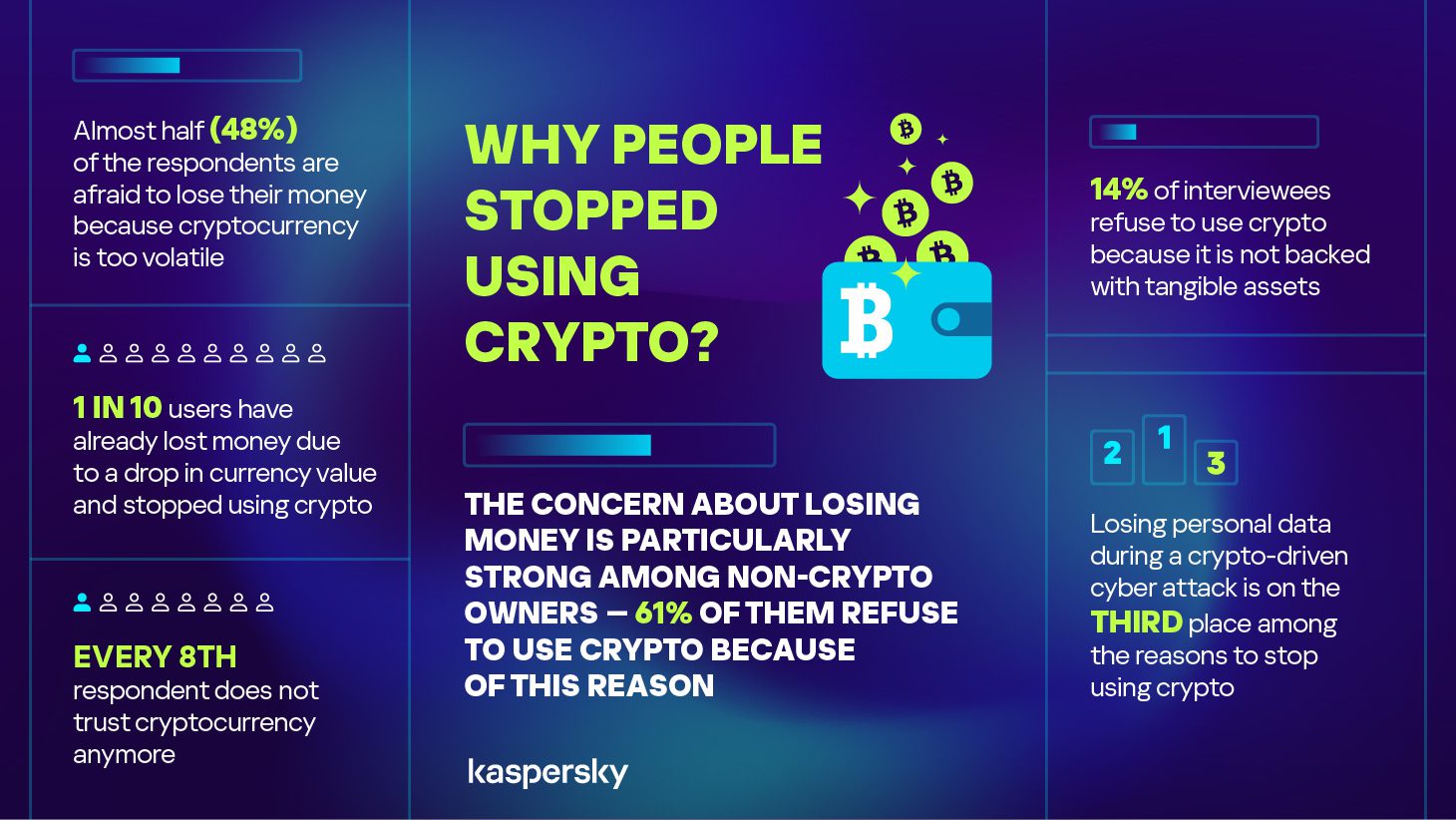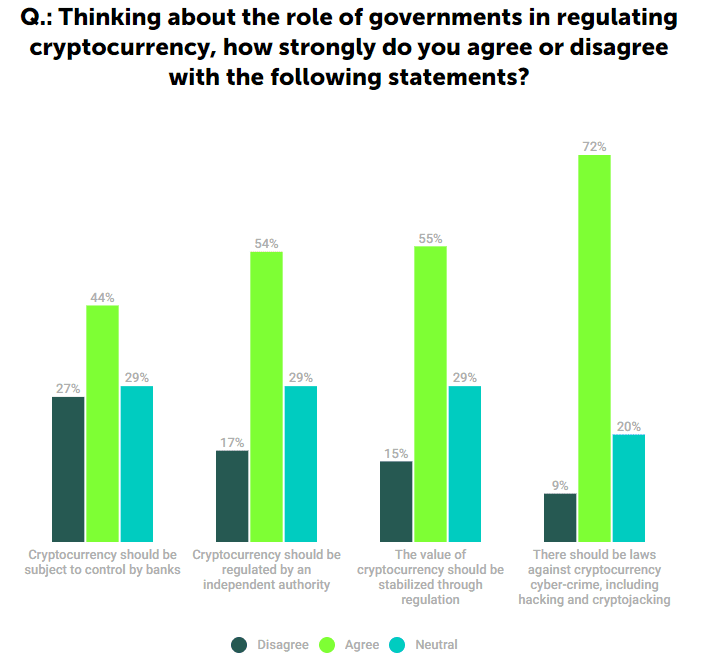- The report is based on a survey of over 12,000 people from 16 countries, providing valuable insights into individuals’ attitudes and behaviours towards cryptocurrencies
- Those in Generation Z (18-24 years) and younger millennials (25-34 years) are best informed about cryptocurrency
- Just under half of respondents have not been affected by known threats associated with cryptocurrency.
The cryptocurrency survey report for 2022, published by Kaspersky, provides a comprehensive overview of the current state of the cryptocurrency market and how individuals and businesses are using digital currencies. The report is based on a survey of over 12,000 people from 16 countries, providing valuable insights into individuals’ attitudes and behaviours towards crypto. The survey revealed volatility, ownership, usage, cybercrime and regulation insights.
Cryptocurrency has become a rapidly growing trend in recent years, with more and more people investing in digital currencies like Bitcoin and Ethereum. To better understand this trend, Kaspersky, a leading cybersecurity company, surveyed people worldwide to examine the attitudes and behaviours of people around the world towards cryptocurrency. Arlington Research undertook the survey. Kaspersky recently published the survey results in the Cryptocurrency Survey Report 2022.
Cryptocurrency survey demographics
The survey covered people in 16 countries; Austria, Brazil, Colombia, France, Germany, India, Malaysia, Mexico, Saudi Arabia, South Africa, Spain, Switzerland, Turkey, UAE, the UK, and the USA. The survey group, therefore, included all continents. The people surveyed varied from regular users, those experimenting, owners who do not actively use it, former crypto users and people who never owned cryptocurrency. The ages of participants were from 18 to over 75 years.
The survey found that many people are investing in cryptocurrency, with one in three respondents reporting that they have invested in digital currencies. This figure is even higher among young people, with more than half of those aged 18-24 reporting that they have invested in cryptocurrency. The most popular reason for investing in cryptocurrency is the potential for high returns, with 68% of respondents citing this as their primary motivation. Other reasons included the ease of buying and selling cryptocurrencies, the desire to diversify investment portfolios, and the potential for anonymity.
GenZ & young millennials best informed about crypto
Amongst the respondents, those in Generation Z (18-24 years)and younger millennials (25-34 years) are best informed about cryptocurrency. This includes being well-informed about the threats associated with dealing with cryptocurrency. As you would expect, the understanding dips as age increases. Less than 10% of respondents older than 75 understand the risks well.

Crypto Volatility is the most significant barrier
Despite how attractive crypto is, the major barrier to crypto is the volatility that it has experienced courtesy of the crypto winter. 61% of non-crypto users refuse to do so because of the volatility in crypto. A further 14% refuse to use cryptocurrency because an underlying asset does not back it.

Crypto for profit
33% of respondents who have bought crypto did so for profit. These users particularly view crypto as an investment asset. The subsequent largest response (29%) was using crypto for online transactions or as an online medium of exchange, while 20% used crypto for buying goods or services in a physical store. 22% of respondents use crypto for remitting money within their country, while 16% use it for remitting money outside their country of residence.

However, the survey also revealed some concerns about the safety and security of cryptocurrency investments. A majority of respondents (64%) expressed worries about the potential for theft or loss of their investment. This is a valid concern, as digital currencies are often stored in digital wallets, which can be vulnerable to hacking and theft. Respondents also expressed concerns about the lack of regulation in the crypto market. 59% of respondents believe there is a lack of government oversight and protection.
Cybercrime affected 50% of cryptocurrency users
Just under half of respondents have not been affected by known threats associated with cryptocurrency. Giveaway scams have hit the hardest, claiming 17% of respondents. Investment fraud comes in second at 16%. Both fake crypto exchanges and fake crypto apps have claimed money from 14% of respondents. Crypto phishing scams affected 13% of respondents. Mining equipment scams were the only threat affecting more than 10% of respondents.

The survey found that most people confidently invest in cryptocurrency despite these concerns. Nearly two-thirds of respondents (64%) believe they have enough knowledge and experience to invest in digital currencies. This confidence may be partly due to the increasing availability of information and resources about crypto and the growing number of people investing in it.
The survey also revealed some interesting insights into the attitudes and behaviours of cryptocurrency investors. For example, the survey found that people are more likely to invest in crypto in a favourable financial situation. Respondents who reported feeling financially secure were more likely to have invested in digital currencies. Additionally, the survey found that people are more likely to invest in cryptocurrency when they feel optimistic about the future. Those who are optimistic about their financial future are more likely to have invested in digital currencies.
Cryptocurrency Regulation welcome
Most respondents were happy with some crypto regulations in all regulation scenarios surveyed. The most significant affirmative response (72%) was to laws against crypto-related cybercrime. More than half of respondents (55%) preferred a scenario where cryptocurrency value is stabilized through regulation. This confirms the views on crypto volatility noted earlier. 54% of respondents believe crypto should be regulated. These respondents prefer an independent authority. Unsurprisingly regulation by banks (including central banks as banks) received the lowest affirmative response of 44%.

In conclusion, the Kaspersky Cryptocurrency Survey Report 2022 provide valuable insights into the attitudes and behaviours of people around the world towards cryptocurrency. The survey found that many people are investing in digital currencies. The potential for high returns is the primary motivation for investment. However, the survey also revealed concerns about the safety and security of cryptocurrency investments. Concerns over a lack of regulation in the market were also notable.
Despite these concerns, most people are confident in investing in cryptocurrency. Most respondents believe they have enough knowledge and experience to make informed investment decisions. The survey highlights the need for increased education. Resources are also required to help people make informed investment decisions in the rapidly growing cryptocurrency market.
